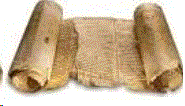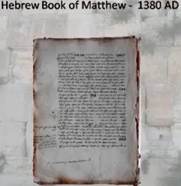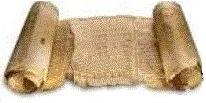| The New Testament was originally written in Hebrew
Q2:
The New Testament was originally written in Hebrew
Hypothesis: Prove the New Testament was orginally written in Hebrew.
Introduction: Hebrew archaeological research is very young. Soon the world will come to understand the entire Bible was originally written in Hebrew. This will cause massive changes to our understanding of Jesus and His coming with New Testament Torah-teachings. The Torah-teachings in the New Testament will stem from the Old Testament better, preserving the same concept of salvation across both Old and New Testaments.
Method: See Jeff Benner's website here. A selection is presented by the author from Jeff's Benner's work and Christopher Lancaster's work "Was the New Testament Really Written in Greek?", 2005.
Discussion:
.
(1) Soldiers wrote messages in Hebrew Soldiers wrote messages in Hebrew

|
In 135 CE Shimon Ben Kosiba lead the final revolt against the Romans. The image left is a fragment of a parchment written by Shimon Ben Kosiba to Yeshua Ben Galgoula and to the men of the fort.. in Hebrew.
|
.
(2) Coins minted in Hebrew Coins minted in Hebrew

|
All coins minted in Israel during the second Temple period include inscriptions written in Hebrew. The coin on the left is written in the late Semitic script bearing the inscription “yerushalem" (Jerusalem). The coin on the right is written in the middle (paleo) Hebrew script with the word “sh’ma" (hear). |
.
(3) Historians spoke only in Hebrew Historians spoke only in Hebrew

|
In his work Antiquity of the Jews Joesphus writes "I have also taken a great deal of pains to obtain the learning of the Greeks, and understanding the elements of the Greek language although I have so long accustomed myself to speak our own language, that I cannot pronounce Greek with sufficient exactness: for our nation does not encourage those that learn the languages of many nations". (Josephus, Ant.20.11.2) |
.
(4) Book of Matthew survives in Hebrew Book of Matthew survives in Hebrew

|
A long time ago a Bishop of Rome invited a debate with Jewish Rabbi, so the Rabbi used a Hebrew version of the book of Matthew….(so history says)….
He writes his arguments, and he writes a copy of Matthew in Hebrew… but where did he get it from ?
He talks about how bad the Matthew text was….
27 other copies of Matthew written in Hebrew, exist in museums, probably a copy of a copy, and after a while it gets errors…
|
.
(5) Paul spoke Greek and Hebrew Paul spoke Greek and Hebrew

|
Ac 21:37 And as Paul was to be led into the castle, he said unto the chief captain, May I speak unto thee? Who said, Canst thou speak Greek "Hellenisti"?
Ac 21:40 And when he had given him licence, Paul stood on the stairs, and beckoned with the hand unto the people. And when there was made a great silence, he spake unto them in the Hebrew "Hebrais" tongue, saying,
|
.
(6) Only three languages nailed to the Cross Only three languages nailed to the Cross

|
Joh 19:20 This title then read many of the Jews: for the place where Jesus was crucified was nigh to the city: and it was written in Hebrew "Hebraisti", and Greek "Hellenisti", and Latin "Rhomaisti".
Image source actual site of Jesus crucification as claimed by Ron Wyatt, adapted Source
|
.
(7) Word puns seen when written in Hebrew Word puns seen when written in Hebrew

|
Hebrew puns
|
 No word puns found in the Greek letters
Hebrew loved word puns !!
No word puns found in the Greek letters
Hebrew loved word puns !!
|
.
(8) Lots of typos during translation from Hebrew Lots of typos during translation from Hebrew

| |
Luke 4:18 The Spirit of the Lord is upon me, because he hath anointed me to preach the gospel to the poor "ptochos" ; he hath sent me to heal the brokenhearted, to preach deliverance to the captives, and recovering of sight to the blind, to set at liberty them that are bruised,
Translator saw "aniy" which can mean poor or humble, rather than "anav" which only means meek.
Isa 61:1 ¶ The Spirit of the Lord GOD is upon me; because the LORD hath anointed me to preach good tidings unto the meek "anav" ; he hath sent me to bind up the brokenhearted, to proclaim liberty to the captives, and the opening of the prison to them that are bound;
|
There are dozens of translation typos in the Greek, here is an example of a more interesting one.
Joh 21:15...He saith unto him, Feed my lambs "arnion".
Joh 21:16...Jesus saith unto him, Feed my sheep "probaton".
Joh 21:17...He saith unto him, Feed my sheep "probaton".
The Greek only have two words for sheep, not like the Hebrew which has three.
 352, "Strong Ones/rams" 352, "Strong Ones/rams"
 7716, young male Sheep 7716, young male Sheep
 6629, Flock 6629, Flock
Le 5:18 And he shall bring a ram(352) without blemish out of the flock(6629),
Ex 12:5 Your lamb(7716) shall be without blemish, a male of the first year:
These words are related by the Ancient Hebrew pictographs, there are three words.
 3532, Sheep 3532, Sheep
 3535, Ewe 3535, Ewe
 3776, Baby female
Ex 12:5 Your lamb(7716) shall be without blemish, a male of the first year: ye shall take it out from the sheep(3532),
Ge 21:28 And Abraham set seven ewe lambs(3535) of the flock(6629) by themselves.
Le 5:6 And he shall bring his trespass offering unto the LORD for his sin which he hath sinned, a female from the flock(6629), a lamb(3776) or a kid of the goats, for a sin offering; and the priest shall make an atonement for him concerning his sin. 3776, Baby female
Ex 12:5 Your lamb(7716) shall be without blemish, a male of the first year: ye shall take it out from the sheep(3532),
Ge 21:28 And Abraham set seven ewe lambs(3535) of the flock(6629) by themselves.
Le 5:6 And he shall bring his trespass offering unto the LORD for his sin which he hath sinned, a female from the flock(6629), a lamb(3776) or a kid of the goats, for a sin offering; and the priest shall make an atonement for him concerning his sin.
So the correct Hebrew text in John would have been...
Joh 21:15...
Feed my little sheep "3532". in "maleness-love".
Joh 21:16... Feed my male sheep "7716" in "maleness-love".
Joh 21:17...Feed my female sheep "3535" in "femaleness-love".
Perhaps now we see why Peter was grieved the third time, He was asked to care for female people with femaleness-love, something that males do only when falling into a marriage like relationship with that person. Jesus was asking for the femaleness-love kind of nurture, but without marital attachments.
.
(9) Transliteration of Hebrew Transliteration of Hebrew
When a translation comes across a word that does not occur in its own language, the orginal word of that language is written in the other language with almost the same spellings. For example in English we have the words "hallelujah" , "sabbath" and "amen" just to name a few that are Hebrew words that came into English. This proves that Hebrew was the origin of these words. In the Greek portions of the Bible we have many Hebrew words spelled exactly the same in Hebrew, because they have no Greek origin or Greek equivalent, so they are retained in the orginal Hebrew. This proves the Greek is a translation of the Hebrew.
Also many words here do have Greek spelling equivalents, but they chose to transliterate the Hebrew spelling instead, out of respect possibly, proving the Greek was a translation.
.
(10) Words spoken in Hebrew Words spoken in Hebrew
When a language comes across an important saying, it often translates the words as the same spelling as a phrase into the translation.
For example
Mr 15:34 And at the ninth hour Jesus cried with a loud voice, saying, Eloi, Eloi, lama sabachthani ? which is, being interpreted, My God, my God, why hast thou forsaken me?
Mt 27:46 And about the ninth hour Jesus cried with a loud voice, saying, Eli, Eli, lama sabachthani ? that is to say, My God, my God, why hast thou forsaken me?
Ps 22:1 ¶ My God, my God, why hast thou forsaken me?
Some say Jesus spoke a different Hebrew phrase, My God My God why are you sacrificing me?
or "My God My God why are you slaughtering me"?
[as a Lamb is slaughtered]
There is much debate over which language Jesus spoke here, but many find Jesus spoke Hebrew, not Aramaic and definitely not Greek.
Source one
Source two
The author's opinion is Jesus would have spoken Hebrew. Many textual evidences challenge this because of Greek translations. If we consider the dropping of Hebrew sounds like "ch" to Greek sound without a "h" sound, and the Greek Septuingt translation guide for converting Hebrew into Greek, then is it reasonable to assume the New Testament was written in Hebrew, and the common people also spoke Hebrew as well.
.
(11) No Greek idioms, only idoms in Hebrew No Greek idioms, only idoms in Hebrew
An idiom is a saying that has a cultural meaning known only to the language itself.
Many people forget the Bible was written in a culture of people called Hebrews, who spoke Hebrew and made words puns and idioms in Hebrew.
For example:-
1. Pick up snakes – Mark 16:18 - "handle their enemies"
2. Cut it off and pluck it out – Mark 9:43-47 - "if something is offending you, stop doing it".
3. Eyes of your heart – Ephesians 1:18 - eyes of understanding.
4. Of the household – Ephesians 2:19 - "the sons of the house of"
5. Bowels of Jesus – Philippians 1:8, 2:1 / Colossians 3:12 / Philemon 7, 12, 20 /
1John 3:17 / 2Corinthians 6:12 - "the affections of Jesus"
6. His face was set – Luke 9:53 "to make up one's mind" Amos 9:4 Jeremiah 3:12 Jeremiah 21:10 Jeremiah 42:15 Jeremiah 44:12
7. Their phylacteries and borders – Matthew 23:5 - 'Tekhelet' is the correct Biblical term here, the name for the actual blue strand in the 'tzitzit', or fringes. See Numbers 15:38
8. Who shall declare his generation? – Acts 8:33 - "his line was cut off"
9. Pressed in the spirit – Acts 18:5 - impeded in discources, or stopped from doing things.
10. Son of its hour – Matthew 13:5 - "immediately"
11. High mountain – Matthew 4:8 / Luke 4:5 - "figurative speech" Satan took Jesus on a high mountain. This means he took him to the summit of his highest human imagination, and he made all these offers to him, if Jesus would but fall down and worship him.
12. How your breath should depart – Luke 12:11-12 (1) The Greek translators did not know what to do with the phrase "how your breath should depart",
since this is a Hebrew idiom which means "how to compose your speech" (ie, "speak properly")
.
(12) Poetry seen only in Hebrew Poetry seen only in Hebrew
Only in Hebrew do we see and understand poetry. The Greek does not show this.
Contrast couplets - two verses of poetry where the verses contrast each other.
Mt 3:12 Whose fan is in his hand,
and he will throughly purge his floor,
and gather his wheat into the garner;
but he will burn up the chaff with unquenchable fire.
And re-written slightly to make English rhyme and rthymn, also researching the correct Hebrew meanings of words used, we have:-
Mt 3:12 Whose fan is in his hands,
he will scatter over his floor,
and gather his wheat from the lands;
but he will burn up the chaff in store.
Its a pity we cannot assess the Hebrew properly from the Greek, nor do we know the exact Ancient Hebrew sounds, to restore the original poem in all its sound.
Jeff Benner theme


|
|
 See for more themes.
See for more themes.